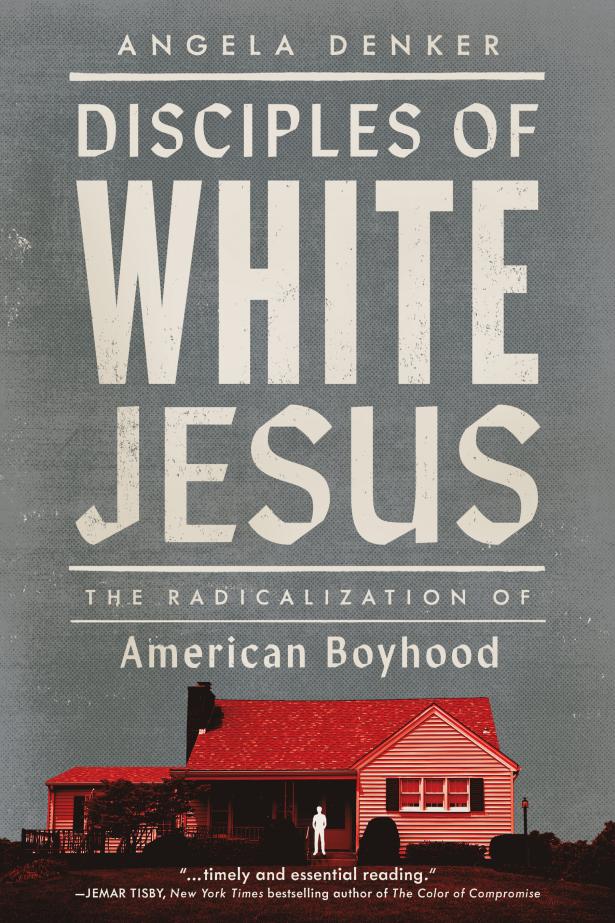books Depictions of a White Jesus Uphold Violent Christian Nationalism, White Supremacy
Disciples of White Jesus
The Radicalization of American Boyhood
Angela Denker
Broadleaf Books
ISBN: 9798889830757
Journalist and Lutheran pastor Angela Denker, herself the mother of sons, knows that boys can be affectionate, caring and sweet, but she also knows that they can be drawn to hate and violence. Disciples of White Jesus: The Radicalization of American Boyhood, Denker’s second book, probes the ways Christian nationalism is marketed to them and exposes the misogyny, racism, homophobia, transphobia and xenophobia that are its stock and trade.
Denker offers a masterful critique of the ways Christianity has helped foment right-wing religious movements, zeroing in on the blonde, blue-eyed Christ that is seen in most U.S. and European churches. She then juxtaposes this image with a more realistic portrait of the “historical, brown-skinned, Middle Eastern, and Jewish Jesus.” The result of this literal whitewashing, she writes, is a “progenitor of the Christian industrial complex that brought us megachurches and celebrity preachers and New York Times bestsellers and the prosperity gospel and Donald Trump.”
Denker finds this appalling and effectively parses how these institutions manipulate language to appeal to young men; her depiction of the way hate is spread by well-dressed preachers, both in person and online, is chilling.
Denker found racism to be a linchpin that was reinforced by pervasive depictions of white Jesus, imagery that she believes leads believers to a reverential distortion.
Moreover, her findings reinforce the conclusions of other researchers: Many young white males gravitate to the right because they feel disempowered by feminism, movements for racial equity, and the changing demographics that will make the United States a less white and less Christian nation within the next few decades.
Dylann Storm Roof, the 21-year-old white man who entered Mother Emmanuel African Methodist Episcopal Church in Charleston, South Carolina, and prayed with congregants at Bible study before taking out a gun and killing eight Black parishioners and their pastor in 2015, is a case in point. Roof, of course, is neither anomalous nor unique. As Denker reports, white men are responsible for the lion’s share of mass murders against Black people throughout the United States.
“Roof was radicalized online,” Denker writes, “and he was an active reader of and visitor to sites like the Council of Conservative Citizens … Roof mentioned the Council as part of his awakening in an unsigned 2,444-word manifesto on his website, which also included photos of himself taken with a self-timer at slavery-related sites across South Carolina.”
Roof’s evolution is fascinating, and Denker reveals that he not only lacked a “positive rooted identity” but struggled academically and socially. “He found his identity,” she writes, ”in hatred of others, and that identity of hatred festered and grew in social circles where people may have mentioned racism or prejudice but didn’t confront it … preferring to avoid uncomfortable topics or introspection.”
This sidestepping allowed Roof to cling to resentment and his presumed entitlement to an elevated place in a white, male-dominated Christian hierarchy. That this idea was supported by the right-wing Christian and white supremacist forums and websites he visited and videos he watched goes without saying. What’s more, Roof saw this messaging as gospel truth and was elated by the sense of belonging he found in a host of online communities.
These communities also fed him a hefty helping of toxic masculinity; Denker notes that Christian nationalist speakers and written materials hammer visible shows of emotion as unmanly, as if vulnerability is a surefire “recipe for disaster, a potential upheaval in a society that has placed white Christian men at the top of a teetering house of cards.”
For teetering men like Roof, it was far easier, and likely more pleasant, to turn his fury toward people he felt were getting more than they deserved than it would have been to probe his disquiet and pain. It’s a sad revelation and one that was repeatedly replayed in sites all over the country, from the Citadel Military College to the far-flung churches and youth ministries that Denker visited. Throughout, she found racism to be a linchpin that was reinforced by pervasive depictions of white Jesus, imagery that she believes leads believers to a reverential distortion. But there is an antidote: “Reminding young, white Christian boys and men that Jesus is not a white man forces them to take Jesus and put him into a seat often occupied by people who are oppressed and marginalized,” she writes, “and whose strength and power are seen more often as a deviant threat than as something to be emulated and admired.”
Despite many strengths, the book falters by not offering more than individualistic responses to the false depiction of the man Christians claim to revere. While one-to-one counseling and making a personal connection to boys who feel cast aside is essential, so too is confronting, opposing and organizing to stop the promotion of white male gender grievance, rivalry and white supremacy.
Denker wants all men and boys to learn to love and be open and respectful to both peers and strangers. It’s a laudable goal, and while there are no ready-made strategies to get us there, it will clearly take all of us to make Christian nationalist messaging unappealing to viewers, listeners and readers.


Spread the word